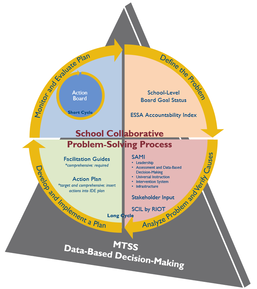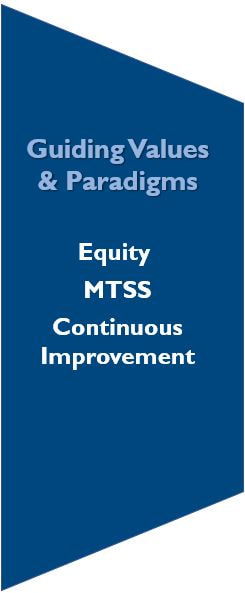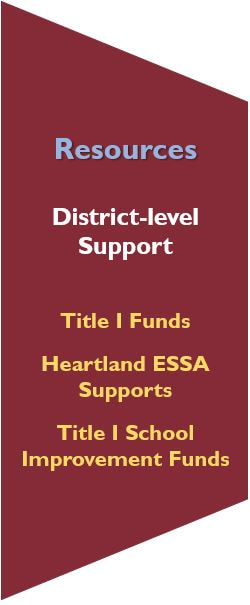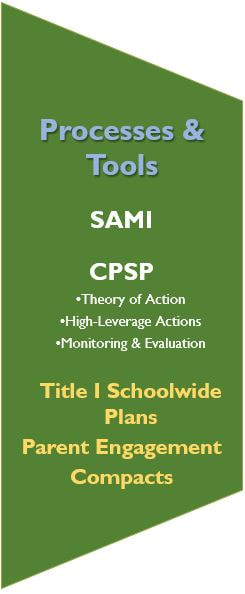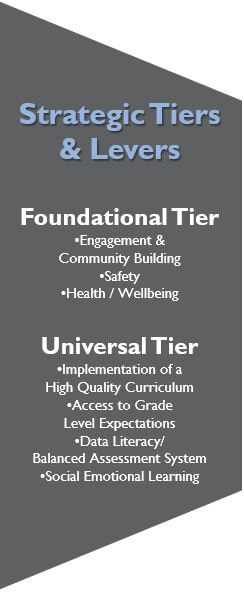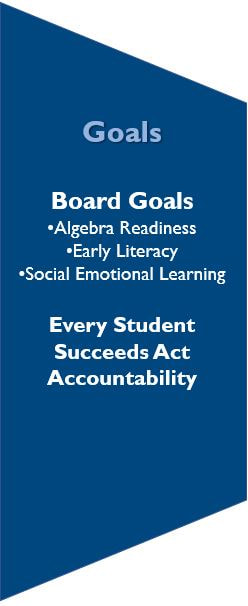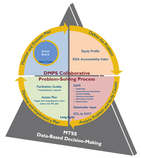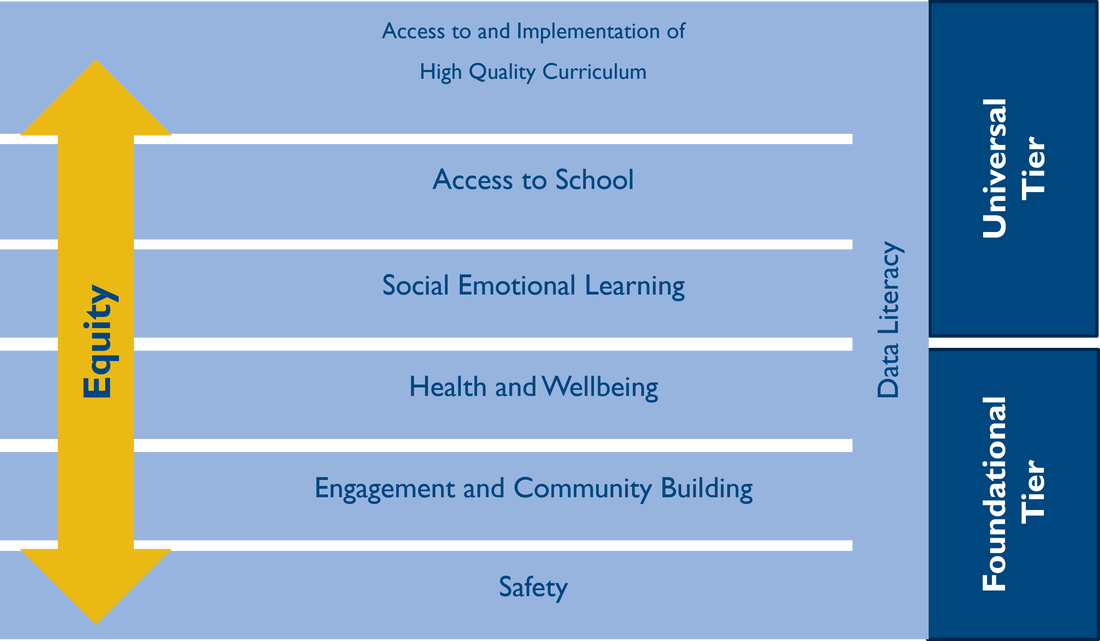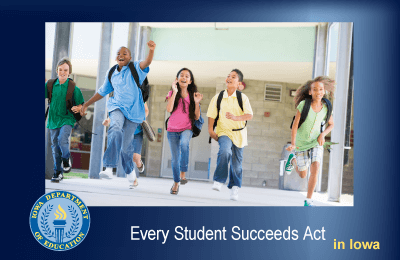DMPS Continuous School Improvement
|
A Multi-Tiered System of Supports (MTSS) is a term used to describe an evidence-based model of education that uses data-driven problem-solving to integrate academic and behavioral instruction and intervention. To make decisions to implement the system of supports, the use of a structured, data-driven problem-solving process is a critical component of support to assure that each of the tiers included in the MTSS model is constructed in response to the specific needs of the students.
As we examine district data, we are committed to keeping an equity focus on how we serve students from all groups and determine their needs. Additionally, we must be inclusive of all voices through the problem-solving process and believe that when we engage students, families, and the community as authentic education partners, the learning becomes more dynamic, and students can grow academically, socially, and emotionally. Equity, inclusiveness, continuous improvement, and evidence-based decision-making should be foundational to all DMPS structures. |
Schools: Upload/edit your working version of your school DMPS Collaborative Problem-Solving Process template for Continuous School Improvement here:
Here at DMPS, School improvement is rooted in our Guiding Values and Paradigms. These values, as explained below, are embedded in every part of school improvement and are at the forefront of our decision making process. The Every Student Succeeds Act, signed into law December 10th, 2015, was enacted to ensure the success for all students and schools. Provisions were included to address equity by protecting our students with the highest needs. The act also sets the expectation that intentional actions and accountability will be used to improve our lowest performing schools.
|
Equity
At Des Moines Public Schools we are committed to ensuring an equitable educational experience for all. We strive to live inclusively by embracing the diversity of race, ethnicity, gender, gender identity and/or expression, sexual orientation, socio-economic status, religion, ability level, age, citizenship status, military or veteran status, and language. We believe that when we engage families and the community as authentic education partners, the learning becomes more dynamic, and students can grow academically, socially, and emotionally. Click here to read more. |
Multi-Tiered System of Supports (MTSS)
Multi-Tiered System of Supports (MTSS) in Iowa is an every-education decision-making framework of evidence-based practices in instruction and assessment that addresses the needs of all students in general education. Click below for more information MTSS Overview (Heartland AEA) MTSS Concept Map (Heartland AEA) |
Continuous Improvement
The mission of the Continuous Improvement Department is to provide district employees an established approach to evaluate all processes in order to identify opportunities for improvements leading to increased efficiencies, effectiveness, and greater student outcomes. Click here for more information. |
In Person Supports
|
District-Level Support
District support is available to all buildings through the Network Support Structure. You can connect with district level experts, receive additional staff training, and participate in collaborative development. Network Support Team members collaborate with schools to support their action plans to achieve improved results. Contact your network director or your curriculum coordinator to learn more. Heartland ESSA Supports Heartland ESSA supports are available both through online and in person regional training events, as well as additional training support through the Network Support Structure. Heartland staff who are specially trained to support schools regarding their ESSA designation and in building capacity for MTSS are available. For more information, contact Crista Carlile. |
Title I Team Supports
The individuals below are available to provide schools with supports specific to Title I programming. Areas of support for each person include:
|
Process & Tools
For All DMPS Schools
All DMPS schools participate and receive supports through the Self Assessment of MTSS Implementation (SAMI) and the Collaborative-Problem Solving Process (CPSP).
SAMI
|
Collaborative Problem-Solving Process
|
Title I Resources Related to Program Requirements
The 41 DMPS schools with the highest percentages of students whose families meet low income requirements have been identified for Title I program supports. Click below for access to school documents.
Guidance and Resources
CPSP with Schoolwide Plans Guidance
Canvas Course for CPSP with Schoolwide Plan
Title I Parent's Right to Know Letters
CPSP with Schoolwide Plans Guidance
Canvas Course for CPSP with Schoolwide Plan
Title I Parent's Right to Know Letters
Strategic Tiers & Levers
|
The Strategic Tiers & Key Levers are a direct result of the Community Based Collaborative Problem Solving Process, which began in the fall of 2019 with work which is ongoing. Through the support of district staff, the members of the Community CPSP team found that across the identified Board Goal Areas (more information below), there were two Tiers of work; Foundational and Universal.
The Foundational Tier is broken into three levers, Health/Wellbeing, Safety, and Engagement & Community Building, and the Universal Tier is broken into four levers, Social Emotional Learning (SEL), Data Literacy & Balanced Assessment System, Access to Grade Level Expectations, and Implementation of High Quality Curriculum. These levers will be addressed through DMPS' Multi-Tiered System of Supports over the next three years in order to meet the Board Goals. More information can be found in the Board Goals Action Plan, which available here. |
DMPS Board Goals
School Improvement in Des Moines Public Schools is rooted in the Board Goals, which are:
Literacy
More information on the establishment of the Board Goals can be found here. |
Every Student Succeeds Act (ESSA)
Under the Iowa plan (add link here??) to meet the requirements of the Federal Every Student Succeeds Act (ESSA), schools are designated for support on either a yearly (Targeted Support) or every three years (Comprehensive Support) basis.
Once a school is identified as receiving Targeted or Comprehensive support, they maintain that status for three years. Schools are selected identified based on their rating on the Iowa School Performance Profile. To complete the requirements determined through these ESSA designations, DMPS uses the Collaborative Problem-Solving Process and the Self Assessment of MTSS Implementation (SAMI) to determine opportunities for improvement |
